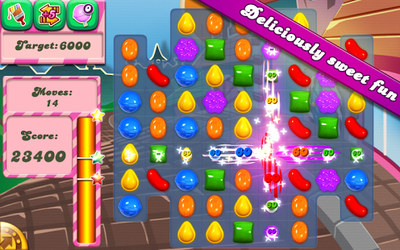|
Apparently if you spend four to five hours playing Candy Crush you're an addict, well I guess that makes a lot of us. Sure some folks have alcohol, cigarettes and drugs, whereas today's addictions not only include sex and masturbation but hoarding and the playing of video games.
What started out as research for this blog, turned into a new affliction. All I can think about is candy, not eating it, but crushing it. It is like a mixture of packing a moving van, Candy Land, and Apples to Apples the children's memory game. Sure Tettris was and is amazing, but they don't have some deep-voiced dude say SWEET and DELICIOUS when you make a nice move. And although slightly erotic the game can be rather difficult to master, hence why it is so addictive. In March, Candy Crush's estimated IPO value was $7.1bn, where apparently these things are certainly working in their favor. There is a psychological formula to game design, where earlier this year the Dong Nuygen actually pulled his game Flappy Bird from the internet as a sort of moral high road escaping $50,000 in daily ad revenue and thus saving us all from ourselves. It's too bad these games, their gaming revenue, and the time wasted on them couldn't be better linked to the moral high road. Otherwise in the meantime you can find me this Memorial Day weekend crushing some candy, and for what, who knows, maybe just to crush some brain cells.
0 Comments
Leave a Reply. |
LAJ
100 Objects of Popular and Material Culture is an blog exploring the manifestations of human consumption and commodity-ization. The purpose of this experiment is to explore material and popular culture in contemporary society by using objects and concepts to prompt wider questions and reflections. So by emulating The British Museum's and Neil MacGregor's format of A History of the World in 100 Objects I plan to satirically analyze and reinterpreted 100 material culture objects over the course of 2014. Material Culture is the study of our culture's consumption of stuff; namely the manifestation of culture through material productions where people's perceptions of objects is socially and culturally dependent. With this, objects reflect conscious and unconscious beliefs on the the individuals who fabricated, purchased, or used them, and by extension the society where they live. So examining materiality, cultural truths and societal assumptions may be discovered. As anthropologist Arjun Appaduai states "in any society the individual is often caught between the cultural structure of commodity-ization and his own personal attempts to bring a value and order to the universe of things." Objects and commodities make up a much larger symbolic system consisting of want and need, socio-economic status, fashion, etc. Often times form follows function whether the commodity, market, and or consumer forever evolve around one-another. Philosopher Pierre Bourdieu's theories of capital flow full circle; where regardless if you are a minimalist or a hoarder the world is made up of things and everyone will leave their footprint on the earth. So by humorously analyzing marketed objects and concepts, hopefully this blog will provide further incite into ideas of over-consumption, a disposable society, consumerism vs. anti-consumers, planned obsolescence vs. sustainability, as well as the greater good of mankind and future generations. Archives
March 2015
Categories |



 RSS Feed
RSS Feed